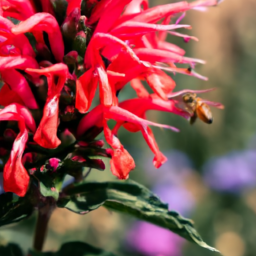In recent years, the alarming decline of honeybee populations has raised significant concerns among scientists, farmers, and environmentalists alike. Honeybees play a crucial role in pollinating crops, contributing to food production and biodiversity. As observed in various studies, the health of these pollinators is under threat from numerous factors, including habitat loss, pesticide exposure, and diseases. However, new research has unveiled a promising avenue for improving honeybee health through the natural properties of pollen. Recent discoveries indicate that pollen is not just a food source for honeybees but also a reservoir of beneficial microorganisms. Among these microorganisms are symbiotic bacteria known as Streptomyces, which produce antimicrobial compounds. These compounds are effective in combating various pathogens that threaten both bees and plants. This finding suggests that honeybees have developed a natural defense mechanism by collecting these bacteria along with pollen and storing them in their hives. In my experience observing bee behavior and health, the relationship between bees and their environment is intricate and multifaceted. Honeybees gather pollen from a variety of flowering plants, and in doing so, they inadvertently collect Streptomyces bacteria. This symbiotic relationship is crucial, as it enhances the bees ability to fend off diseases that can decimate colonies. Research shows that these antimicrobial compounds can inhibit the growth of harmful fungi and bacteria, thereby providing bees with a form of natural medicine. The implications of this discovery are significant. According to official reports from agricultural and environmental organizations, the decline in bee populations has dire consequences for global food security. Approximately one-third of the food we consume relies on pollination, primarily by bees. Therefore, understanding and harnessing the natural defenses that honeybees possess could lead to innovative, sustainable methods for protecting these essential pollinators. Experts agree that the findings surrounding Streptomyces bacteria could revolutionize how we approach bee health management. Historically, beekeepers have relied on chemical treatments to combat diseases and pests, which can sometimes have detrimental effects on bee populations. The use of natural antimicrobial compounds derived from pollen may offer a more sustainable alternative. This shift towards natural solutions aligns with broader trends in agriculture that emphasize organic practices and reduced chemical inputs. Moreover, the research into pollens medicinal properties opens up new avenues for crop protection as well. By understanding how these antimicrobial compounds work, scientists can explore their potential applications in agricultural practices. For instance, incorporating these natural compounds into crop management strategies could enhance plant resilience against pathogens, ultimately leading to healthier ecosystems. The role of Streptomyces in honeybee health is not just a scientific curiosity; it represents a critical intersection of ecology and agriculture. As observed in various studies, the health of pollinators is directly linked to the health of our food systems. Therefore, fostering an environment that supports both bee populations and agricultural productivity is essential. This can be achieved through practices such as planting diverse flowering crops that encourage the growth of beneficial bacteria in the soil, thereby enhancing the overall health of pollinators. The research also highlights the importance of biodiversity in agricultural landscapes. By promoting a variety of flowering plants, farmers can create habitats that support not only honeybees but also other beneficial insects. This holistic approach can lead to improved pollination services and, consequently, better crop yields. As experts note, sustainable farming practices that prioritize biodiversity are crucial for long-term agricultural success. Despite the promising nature of these findings, it is essential to approach the implementation of natural solutions with caution. While the potential benefits of using Streptomyces-derived compounds are significant, further research is needed to fully understand their effects on bee health and agricultural productivity. Regulatory agencies will need to evaluate these natural compounds to ensure they are safe and effective for widespread use. In conclusion, the discovery that pollen harbors beneficial bacteria capable of enhancing honeybee health presents an exciting opportunity for both conservation and agriculture. As research continues to unfold, it is crucial for stakeholders, including farmers, beekeepers, and policymakers, to collaborate in developing strategies that leverage these natural defenses. By prioritizing the health of honeybees and promoting biodiversity, we can work towards a more sustainable future for our food systems and the environment. The implications of this research extend beyond honeybees; they offer a glimpse into a more harmonious relationship between agriculture and nature, one that could ultimately safeguard our food supply for generations to come.
TRENDING NOW
WORLD
Global Messaging Trends: Can Local Apps Like Arattai Overtake Giants?
44% 🔥
POLITICS
Accusations fly over whether Republicans or Democrats 'own' shutdown
35% 🔥
POLITICS
Rep. Mike Haridopolos, R-Fla., talks about the government shutdown
34% 🔥
POLITICS
What happens now that the government has shut down. And, a pricing deal with Pfi...
26% 🔥
POLITICS
Married, but no connection: Reality of silent divorces in Indian homes
31% 🔥
POLITICS
Netanyahu's apology to Qatar, phone on Trump's lap: A telling White House photo
38% 🔥
MOST READ
SPORTS
Week 5 NFL odds, lines, betting picks, spreads: 2025 predictions: Model backs Sa...
55% 🔥
SPORTS
Predicting every undefeated college football team's first loss: Will anyone beat...
36% 🔥
SPORTS
Tigers Lefty Tarik Skubal Deserves Second Straight AL Cy Young Award
54% 🔥
SPORTS
Jets Get Official Braelon Allen Injury Diagnosis
61% 🔥
SPORTS
Gill: India won't be 'looking for any easy options' against West Indies
49% 🔥
SPORTS
Phil Mickelson takes a jibe at golf during friendly banter with ex-LIV Golf CEO’...
39% 🔥

